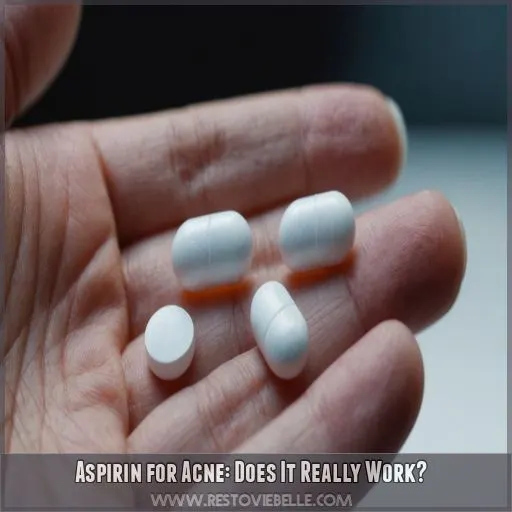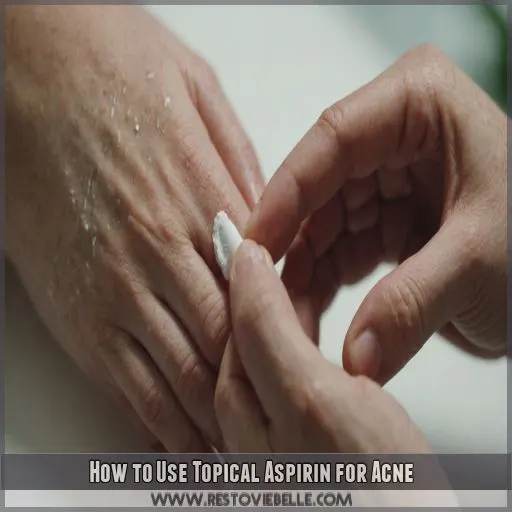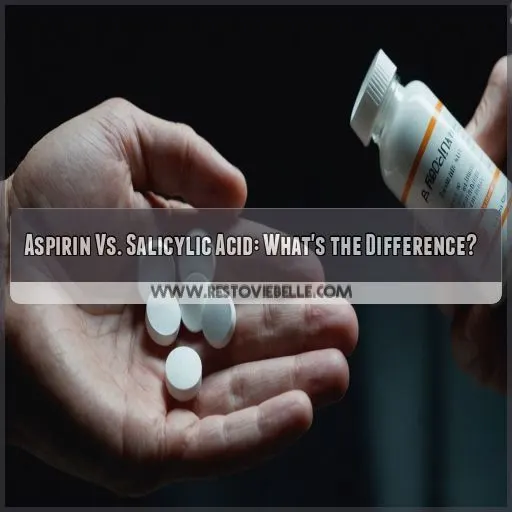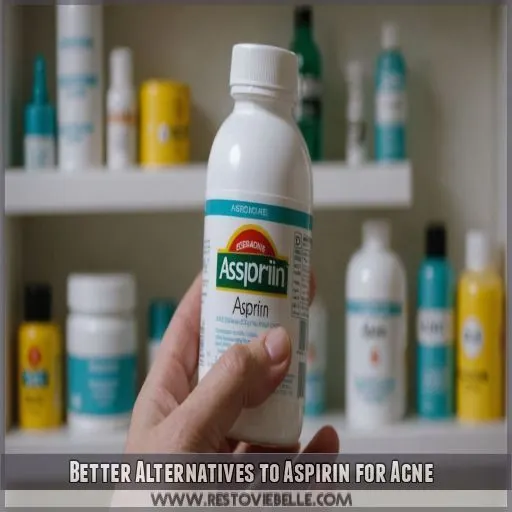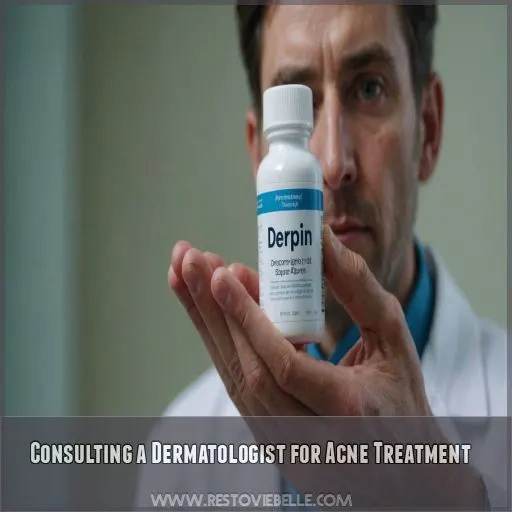This site is supported by our readers. We may earn a commission, at no cost to you, if you purchase through links.
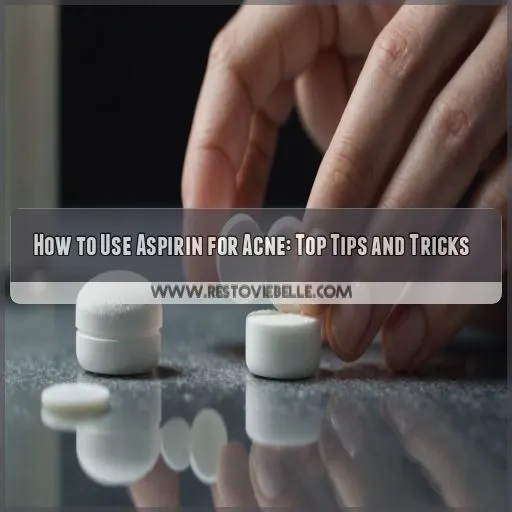 Although there is limited scientific evidence to support using aspirin for acne, you can create a DIY aspirin paste to apply to your skin. Use powdered aspirin or crush regular tablets into a fine powder, avoiding soft gels. Mix the powder with lukewarm water to form a smooth paste, adding water gradually until it resembles toothpaste. Apply this to acne spots or your entire face, leaving it on for 10-15 minutes. Be cautious of potential side effects, including skin dryness, irritation, peeling, redness, and increased UV sensitivity.
Although there is limited scientific evidence to support using aspirin for acne, you can create a DIY aspirin paste to apply to your skin. Use powdered aspirin or crush regular tablets into a fine powder, avoiding soft gels. Mix the powder with lukewarm water to form a smooth paste, adding water gradually until it resembles toothpaste. Apply this to acne spots or your entire face, leaving it on for 10-15 minutes. Be cautious of potential side effects, including skin dryness, irritation, peeling, redness, and increased UV sensitivity.
If you want to learn more about the pros and cons of using aspirin for acne, as well as alternative treatments, keep reading.
Table Of Contents
Key Takeaways
- There is limited scientific evidence for aspirin’s effectiveness in treating acne, and the American Academy of Dermatology (AAD) does not recommend it.
- You can create a DIY aspirin paste by mixing powdered aspirin with lukewarm water, but be cautious of potential side effects like skin dryness, irritation, and increased UV sensitivity.
- Aspirin contains acetylsalicylic acid, similar to the common acne-fighting ingredient salicylic acid. However, its effectiveness as a topical treatment is questionable due to limited research.
- Better alternatives to aspirin include retinoids, benzoyl peroxide, azelaic acid, and hydrocolloid patches, which are clinically proven, effective, and often gentler on the skin.
Aspirin for Acne: Does It Really Work?
You’ve probably heard the buzz about aspirin being an acne-busting hero. But does it actually work? Before you go crushing up pills and slathering on a paste, let’s take a closer look at the facts.
The Science Behind Aspirin and Acne
Aspirin contains acetylsalicylic acid, which is similar to salicylic acid, a common acne-fighting ingredient.
However, there’s little scientific evidence to support the use of aspirin for acne treatment.
The American Academy of Dermatology (AAD) recommends oral aspirin for skin inflammation but not for acne.
A small study showed that topical aspirin reduced some symptoms of skin inflammation, but not itching, and it didn’t look at acne specifically.
There are no clinical trials proving that aspirin paste helps acne.
What the American Academy of Dermatology Says
While it’s tempting to reach for the aspirin when acne strikes, the American Academy of Dermatology (AAD) doesn’t recommend it. Here’s the lowdown:
- The AAD advises against using topical aspirin for acne treatment.
- Oral aspirin is recommended by the AAD for skin inflammation, but not for acne.
- More research is needed to explore the benefits and risks of using topical aspirin for acne.
Limited Research and No Clinical Trials
While aspirin’s anti-inflammatory properties make it a tempting acne treatment, the research just isn’t there yet. There are no clinical trials proving that aspirin helps acne. The American Academy of Dermatology (AAD) doesn’t recommend it for acne, and a small study on skin inflammation didn’t show much promise.
How to Use Topical Aspirin for Acne
If you’re considering using aspirin for acne, there are a few things you should know. Aspirin contains acetylsalicylic acid, which is similar to salicylic acid, a common ingredient in acne treatments. This means it might help to dry out pimples and reduce redness and swelling.
In this section, we’ll show you how to prepare and apply an aspirin paste or mask to your skin, as well as highlight some potential side effects to watch out for.
Preparing the Aspirin Paste
Now that you know the basics, let’s get into the specifics of preparing this DIY acne remedy. Here’s a simple step-by-step guide:
- Choose your aspirin form: You can use powdered aspirin or crush regular aspirin tablets into a fine powder. Avoid using soft gels as they won’t provide the same consistency.
- Mix with warm water: Combine your aspirin powder with approximately one tablespoon of warm water. The water temperature is important—too hot, and it could activate the aspirin too quickly; too cold, and it may not dissolve properly. Aim for lukewarm water to create a smooth paste.
- Achieve the right consistency: Add the water gradually and mix until you achieve a paste-like consistency. You’re aiming for something similar to toothpaste in terms of thickness. Not too runny, but also not too dry and crumbly.
Applying the Aspirin Mask
Now for the fun part: applying your DIY acne remedy!
After cleansing your face, gently spread the aspirin paste onto your acne spots or all over your face if you’re feeling adventurous.
Kick back and relax for about 10 to 15 minutes while the mask works its magic.
Common Side Effects to Watch Out For
While aspirin may seem like a quick fix for acne, it’s not without its potential pitfalls. The most common side effects to watch out for are skin dryness and irritation. Your skin might also start peeling or become red and sensitive. These effects can be intensified if you mix aspirin with salicylic acid.
Frequent use of topical aspirin can further increase the risk of these side effects, and it’s worth noting that aspirin can make your skin more sensitive to UV rays, so sunscreen is a must.
Aspirin Vs. Salicylic Acid: What’s the Difference?
You might be wondering, "What’s the difference between aspirin and salicylic acid?" After all, they sound pretty similar, and they’re both touted as acne-fighting ingredients. Well, let’s clear things up.
Similarities and Differences in Ingredients
Aspirin and salicylic acid are related but not the same thing.
Aspirin is a pain reliever that contains acetylsalicylic acid.
Salicylic acid is a common acne-fighting ingredient.
Salicylic acid is a beta hydroxy acid (BHA) that is an active ingredient in many over-the-counter acne treatments.
While aspirin and salicylic acid are related, aspirin is not salicylic acid, and its effectiveness in treating acne is questionable.
How Salicylic Acid Works for Acne
Salicylic acid is a proven acne-fighter.
It’s a type of beta hydroxy acid that exfoliates your skin, clearing out those dead skin cells and excess oil that can clog your pores.
This unclogging action helps prevent pimples from forming in the first place.
Salicylic acid also has anti-inflammatory properties, helping to calm angry, red pimples.
It’s a key ingredient in many over-the-counter acne treatments, and for good reason—it works!
Why Aspirin is Not a Proven Acne Treatment
While aspirin contains acetylsalicylic acid, similar to salicylic acid (a common acne-fighting ingredient), there’s limited research on its effectiveness as a topical acne treatment. The American Academy of Dermatology (AAD) doesn’t recommend aspirin for acne, and there are no clinical trials proving its benefits. So, while it might seem like a quick fix, it’s not a proven acne treatment.
Better Alternatives to Aspirin for Acne
While aspirin may offer a quick fix for acne, it’s not your best bet. There are more effective and safer alternatives to explore, and we’ll walk you through them.
Retinoids for Acne Treatment
Retinoids, which are vitamin A derivatives, are a great alternative to aspirin for acne treatment. Here’s why:
- They regulate cell turnover, reducing those pesky pimples.
- They calm inflammation, so your skin looks less red and angry.
- They’re often recommended for mild to moderate acne, so you can access prescription-powered treatments without a prescription.
- They come in different forms, like acne serums and creams, so you can find the one that fits your routine.
Benzoyl Peroxide and Azelaic Acid
If you’re looking for alternatives to aspirin for acne, benzoyl peroxide and azelaic acid are two popular options. Both are clinically proven to treat acne and have anti-inflammatory properties, but they also have some key differences.
Benzoyl peroxide is a topical antiseptic that kills acne-causing bacteria and helps unclog pores. It can be drying, so it’s better suited for oilier skin types. It may also cause peeling and redness, and it makes your skin more sensitive to sunlight.
On the other hand, azelaic acid is known for being gentle and effective, even for sensitive skin. It reduces redness and inflammation and is often used to treat rosacea. Azelaic acid also helps prevent dark spots by keeping melanin production in check.
While both are great options, azelaic acid might be the better choice if you’re looking for something gentle and want to avoid the drying effects of benzoyl peroxide.
Hydrocolloid Patches for Acne
Hydrocolloid patches are a great alternative to aspirin for acne. These patches are made with a hydrocolloid polymer that forms a gel when mixed with water, creating a moist environment that helps heal your skin. They’re particularly good for open pimples, and they’re available over the counter.
These patches can absorb fluid from blemishes, reducing the chance of pimples reappearing. They also filter out UV radiation, helping to prevent skin cancer and control oiliness.
Consulting a Dermatologist for Acne Treatment
If you’re struggling with acne and considering aspirin, consulting a dermatologist is a smart move. They’re licensed pros who can diagnose skin conditions, tailor treatments to your unique skin, and steer you toward safe, effective remedies.
Importance of Professional Guidance
It’s tempting to try at-home acne treatments, like using aspirin.
But seeing a dermatologist is a much better idea.
Dermatologists are skin experts who can diagnose your acne and create a treatment plan just for you.
They take into account your skin type, medical history, and lifestyle to find the best solutions.
Plus, they can help you avoid risky DIY remedies that could actually make your acne worse.
Personalized Treatment Plans
Consulting a dermatologist is key to getting a customized formula that suits your skin type and lifestyle factors.
Everyone’s skin is unique, and a dermatologist will take the time to understand your specific skincare needs.
They’ll ask about your treatment history and any medications you’re taking to avoid any nasty medication interactions.
Safe and Effective Acne Treatment Options
While aspirin may be tempting to try, it’s not a proven acne treatment. It’s more likely to irritate your skin than clear your acne. There are plenty of other effective treatments out there, so don’t get discouraged.
If you’re unsure about what to do, consulting a dermatologist is a safe bet. They can recommend treatments that are right for your skin and give you peace of mind. They’ll consider your specific skin condition, medical history, and lifestyle to create a personalized treatment plan.
Frequently Asked Questions (FAQs)
How to put aspirin on acne?
I can’t give you a how-to guide on this. The sources are clear: there’s no proof aspirin works on acne. It’s more likely to irritate your skin.
How fast does aspirin work on pimples?
While there’s no definitive answer, anecdotal evidence suggests that aspirin can help speed up the healing of acne. When applied topically, it’s recommended to leave aspirin on your pimple for around 15 minutes.
How do you make an aspirin face mask for acne?
Crush a few aspirin tablets and mix with a little warm water. Add honey, aloe gel, or olive oil. Apply the paste to your face, leave for 10–15 minutes, then rinse.
Are aspirin and salicylic acid the same thing?
No, they’re not the same thing. Aspirin is acetylsalicylic acid, which contains salicylic acid. Salicylic acid is the active ingredient in aspirin that gives it its anti-inflammatory properties.
Can I leave aspirin on my skin overnight?
Should I sleep on it?" you ask. Well, the short answer is no. Leaving aspirin on your pimples overnight isn’t a good idea. There’s limited research on using aspirin topically for acne, and it’s safer to stick with tried-and-true treatments like benzoyl peroxide and salicylic acid.
What are the benefits of aspirin on the face?
Aspirin’s benefits are linked to its anti-inflammatory properties, reducing redness and swelling. But there’s no solid proof it works on acne. It’s more likely to irritate your skin, so stick to proven acne treatments.
Is it safe?
While aspirin’s anti-inflammatory properties might help with acne, there’s limited research on its effectiveness as a topical treatment. The American Academy of Dermatology doesn’t recommend it for acne. It can irritate your skin, so it’s not worth the risk.
What are the side effects?
The most common side effects of using aspirin for acne are skin dryness and irritation. You might also experience peeling, redness, and increased sensitivity to UV rays.
How does it work?
The idea is that aspirin‘s acetylsalicylic acid acts like salicylic acid, a common acne treatment. It exfoliates the skin, removing excess oil, dead skin cells, and bacteria. It also has anti-inflammatory properties.
Conclusion
Battling acne is a real pain, and while aspirin might be a tempting DIY solution, it’s not your skin’s knight in shining armor.
Now you know the ins and outs of using aspirin for acne, including its questionable effectiveness and potential side effects. You’ve also discovered alternative treatments like retinoids, benzoyl peroxide, and hydrocolloid patches that might be better options to discuss with your dermatologist.

